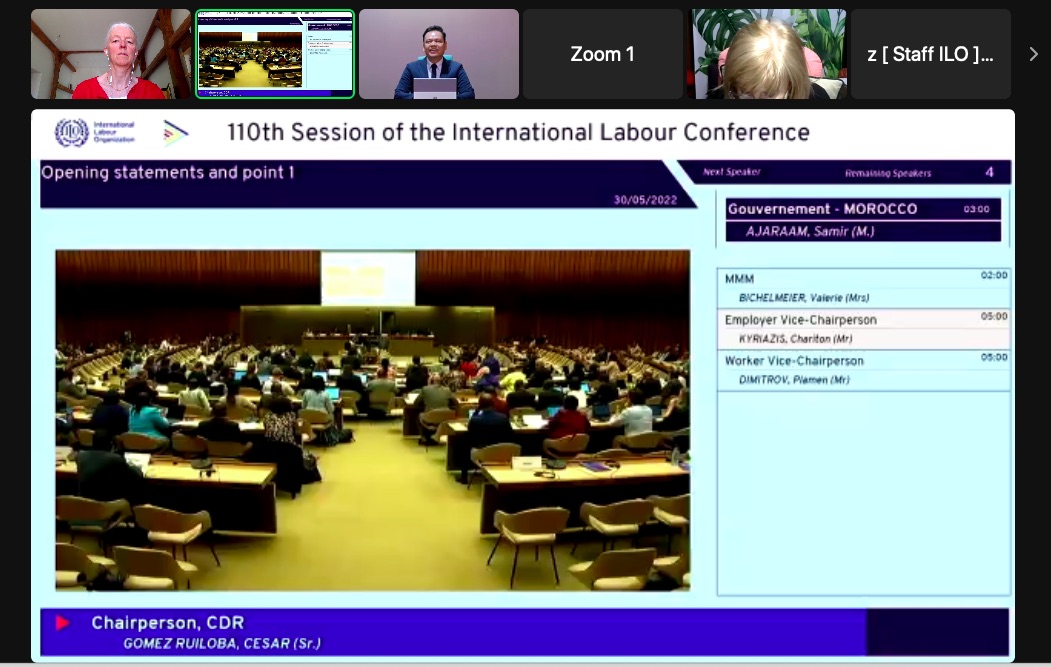Unpaid care work and motherhood: MMM calls on ILO to change employment approach
30.05.22
International Labour conference, Geneva – To redress the economic injustice suffered by many mothers as a result of their caring responsibilities, MMM has called for a new approach to employment: a human-centered perspective where educating and caring for a child or another dependent is viewed not just as a barrier to women's employment, but as essential work, which is intertwined with paid work, benefiting the whole of society and the economy. Employment policies must therefore ensure that this unpaid work and its costs are more equitably shared between men and women, and across society.

The following is our full statement delivered on 30th May at the annual conference of the International Labour Organisation (ILO).
We would like to emphasize that the main structural barrier to women’s employment remains their disproportionate share of unpaid domestic and care work – a cause of economic injustice, in particular for mothers, exacerbated by the pandemic.
The crisis response is an opportunity to redress this injustice and redistribute this essential work more fairly, not only within families – between men and women – but also across society.
Unpaid family care work IS work, necessary work, which benefits everyone and sustains our economy and society.
A human-centred approach to employment must therefore take this reality into account. It must recognize that unpaid care work is a collective responsibility, and that its costs must be redistributed more evenly across society. Everyone, men and women, every stakeholder, including governments and the private sector, must take their share.
Governments at every level are key stakeholders. For them, ‘sharing the care’ means:
- providing affordable and accessible basic public infrastructure and services to reduce provisioning by women’s unpaid work
- ensuring high quality, accessible and affordable care and education services to redistribute this work
- and supporting unpaid caregivers with adequate social protection
For employers, ‘sharing the care’ means embracing a more holistic approach to work, where both paid work and unpaid care work are intertwined and can nurture each other, in particular with regards to skills development. Company-wide family-friendly policies and services to support workers with caregiving responsibilities – both men and women – are long-term investments – with returns.
In summary, we quote feminist writer Nikki van Der Gaag:
“To address the imbalance in unpaid care involves building a caring economy where all policy decisions are based on care not competition; where men and women share care equally and where an ethic of care can counter the violence in our world today.”
The statement was delivered during the first sitting of the Committee on the recurrent discussion on employment, which this year focuses on Responding to the crisis and fostering inclusive and sustainable development with a new generation of comprehensive employment policies. The work of this Committee is part of the 110th International Labour Conference which takes place from 27th May to 10 June in Geneva.

The New EU Gender Equality Roadmap : A Call for Inclusion of Mothers
04.03.25
The European Commission’s initiative on a new Gender Equality Roadmap post-2025, marks a significant step forward in addressing gender disparities across the European Union. Make Mothers Matter (MMM
Breaking the Cycle: Gender Equality as a Path to Better Mental Health
18.03.25
The Council of the European Union has taken a decisive step in recognising the vital connection between gender equality and mental health.
Europe Must Listen to Mothers: Our landmark report heads to the European Parliament
28.08.25
On 22 September 2025, the voices of mothers will take centre stage in Brussels. For the first time, Make Mothers Matter (MMM) will present its State of Motherhood in Europe








